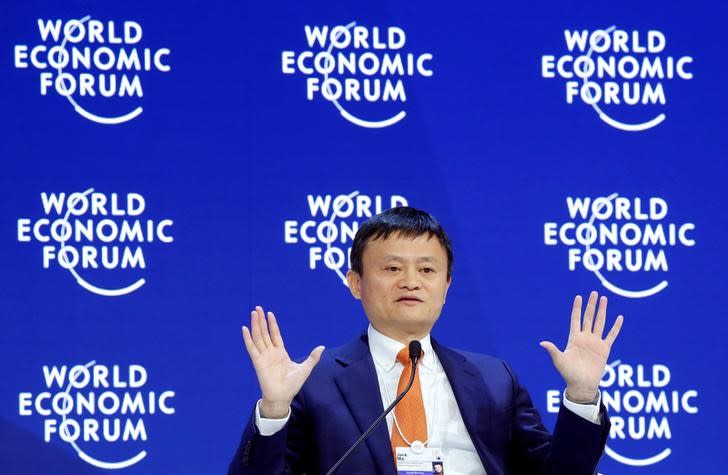The world's most valuable unicorn is a little-known Chinese payment company
This post was updated on June 8, 2018.
When you think of the world’s most valuable tech “unicorns” (private companies with valuations above $1 billion), you likely think of Uber and its $70 billion valuation, Airbnb ($31 billion), SpaceX ($27 billion), and Pinterest ($12.3 billion). These American brands are frequently cited as the representatives of Silicon Valley’s unicorn explosion.
But there’s a unicorn whose valuation trumps all of them: Ant Financial Services Group, which was spun out from Alibaba in 2014 and is the parent company of China’s biggest payments app, Alipay.
Ant has closed a new $14 billion funding round, valuing the company above $150 billion. So this Ant is more like an elephant.
Prior to this round, Ant was last valued at $75 billion by CSLA Hong Kong after a $4.5 billion fundraising round in 2016.
The average American consumer likely has no awareness of Ant Financial, which does most of its business in China. But Ant’s core product, Alipay, already has a quiet presence in the US, and is likely to expand here eventually.
Here’s why you should be aware of Ant.

‘Live your whole life on Alipay’
Before Alibaba’s IPO in 2014, Alibaba (BABA) CEO Jack Ma spun off its payments division under the name Zhejiang Ant Small & Micro Financial Services Group, later Ant Financial. It was obvious Ant would go public, but the wait has lasted longer than expected. In February of this year, Alibaba took a 33% stake in Ant, further stoking market anticipation of an Ant IPO, though some have reported Ant isn’t as eager to go public as Wall Street thinks.
Alipay is the core product of Ant, and it is the most popular digital payments app in China, with more than a 50% share of China’s giant $13 trillion digital payments market. (Even BlackRock is scared of Ant in China.) Alipay launched in 2004 and has ballooned to 520 million users, who conduct more than 100 million transactions on Alipay per day. (Alipay’s big competitor in China is WeChat Pay, from Alibaba’s rival Tencent.) Ant Financial also owns Yu’ebao, China’s largest money-market fund, which has more than 200 million users and manages more than $170 billion in assets.
Ant Financial says it is laser-focused, for now, on serving Chinese consumers—not just in China, but wherever they travel. “The Chinese tourist has come to expect that they can use Alipay wherever they go,” an Ant spokesperson says. “You can basically live your whole life on Alipay.”
Alipay’s app has been described as a combination of all the hottest mobile payments products in the US: PayPal, Venmo, Square, and the new Venmo-like offering from the big banks, Zelle. As an April report from DataTrek puts it, “Right now, there aren’t many analogs in US banking; PayPal and Square are the closest, and both are still working on the regulatory requirements to scale their businesses up to the market opportunity Ant already has in China.”
But it’s easy to imagine Ant more overtly entering America not long from now. Just last year, Ant made a $1.2 billion play to buy Moneygram, which would have handed Ant a major foothold in money transfers in America, but the US government blocked the deal, and just this week the two companies officially announced they have terminated the effort.
And Alipay is already quietly active at 170,000 merchant points in America as a payment option, including in New York City taxi cabs, and even for horse-drawn carriage rides in Manhattan. (You see a pattern: serving Chinese tourists visiting America.)
Of course, that US presence is a minuscule slice of the 800 million people globally that Alipay serves, the bulk of them in China and India. Ant has aggressively spread across Asia in the past two years through partnerships, including a deal with India’s Paytm in 2015, an investment in Thailand’s Ascend Money to launch a new e-wallet called TrueMoney in 2016, an investment in payments company Mynt in the Philippines in 2017, and an investment in payments company Kakao in South Korea in 2017.
Ant Financial’s CEO is Eric Jing, who was formerly the CFO of Alipay, and before that, in 2007, was CFO of PepsiCo in Guangzhou. But the man still first associated with Ant is Jack Ma, and that’s likely to be the case until Ant goes public, whenever that may be.
When the Ant IPO does come, you can expect it to be a gargantuan financial event.
—
Daniel Roberts covers payment technology and cryptocurrency at Yahoo Finance. Follow him on Twitter @readDanwrite.
Read more:
A Chinese fintech behemoth is getting ready to go public
Here’s why Ant Financial’s $4.5 billion round is a very big deal
Bitcoin was supposed to kill Western Union — that hasn’t happened
Circle CEO: We will soon compete with Venmo, Square, Robinhood and Coinbase
